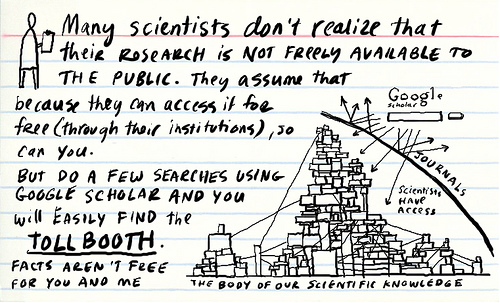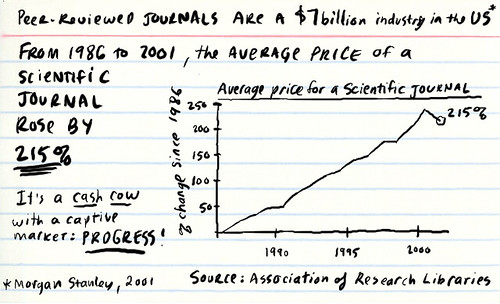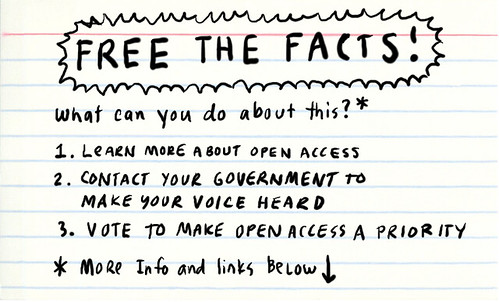I’ve noticed lately when I am doing research for an article on The Psychology of Wellbeing, I am inclined to seek out blogs as my sources as opposed to doing my research in peer reviewed research journals. I am surprised to find myself doing this because the intention of this blog is and always has been to be a vehicle for me to read, assimilate, and discuss research from the field of psychology as it relates to wellbeing. And there is no better way to understand research, than to go straight to the source: the articles by the researchers themselves.
While most of my articles are based on research, there are some problems with research journals which make them difficult to cite from in a blog. The main problem is their lack of accessibility. If I want to write about a specific study, I can always put a reference citation on my blog which shows the authors of the study, the year it was published, and the journal it was published in. But if I want to put a link to the study I have to do a search and see if the published journal article is even available online. Luckily, many researchers do put pdf’s of their research up on their website, but many more do not. And even those who do take some digging to find, since there is not one searchable database with all of these pdf’s (Google Scholar helps a lot.)
The second problem is that a link to the journal article becomes a dead end link. Even though that article might reference and cite multiple other related studies and published articles, they don’t include links and once again, you would have to either search for a free pdf on the author’s website, or have access to a research library, or pay for a subscription or the desired article from the research journal where it was published.
The great thing about blogs is that they are completely linked up and you can quickly go from an article to the sources that were studied for that article, to the sources of those sources and so on, ad infinitum. The fact that you can’t currently do this with scientific research seems pretty archaic (trying to resist using the word “ridiculous”—oops, couldn’t resist.)
There is still a problem with this approach however. Blogs and newspaper stories about research rarely seem to get it right. They emphasize the things that make a good story and deemphasize what might be important, relevant information that is less unexpected, less controversial or less interesting to their readers. And so we still need an improved system.
So here’s my plea:
1. All research (at least publicly funded research) should be immediately placed in the public domain on an easily searchable open access database (See the International Journal of Wellbeing for a rare example of a quality, open-access research journal; See the Public Library of Science, for an example of an open access database.)
2. All citations and references should include links to other articles in the same database or elsewhere on the web.
3. All research articles should have an opportunity for further dialogue and comments (just like a blog.)
One website that still lacks some basic functionality but seems to be moving in the right direction as a place to share and collaborate on research is Mendeley. Check it out and let me know what you think. Also check out the new International Journal of Wellbeing, one of the few interdisciplinary open-access research journals out there.
To get an idea of the costs of not doing this, read Tom Munnecke’s blog “Do Propietary Publishers Kill Children in Africa?” Many things I have read in Tom’s writings have opened my eyes to this issue and so he deserves the credit for this article. Getting research into an open space forum where it can be publicly discussed, questioned, debated, and applied will accelerate the growth of our science and ultimately improve society and civilization as we know it. But until that happens, just keep reading my blog. 🙂
—
References and recommended reading:
Check out Tom Munnecke’s fascinating blog and website: http://munnecke.com/blog/
The post cards above and all of the links below were provided courtesy of Dave Gray at http://www.davegrayinfo.com/
“Facts are an important element of any decision-making process. When we as a society make decisions that affect our future, facts, and conversation or argument about what they mean, is a critical part of those decisions. But facts today are not free. Everyone deserves access to the facts that are necessary to make decisions that affect the future of our world.” –Dave Gray
Read more about open access.
Read an open letter to the U.S. Congress, signed by 26 Nobel Prize winners.
Join the Alliance for Taxpayer Access, a diverse and growing alliance of organizations representing taxpayers, patients, physicians, researchers, and institutions that support open public access to taxpayer-funded research.
Learn more about what you can do to promote open access.
Write your U.S. Representative to demand open access for publicly funded research.
Physicist John Baez on What we can do about science journals.
Mathematician Rob Kirby on math journals
Vote to make open access to research a priority for the Obama administration.





Very interesting and valid points, Jeremy. And I know this sounds silly to many of your readers, but they are also provocative and controversial points. There are many in academe who consider their unfettered – and monopolistic – access to academic publications one of the perks of the job. And more importantly, something that differentiates themselves from the unwashed masses. Think about how Guttenberg and the printing press was an assault on the power of the clergy at the time – once anyone had access to scripture, anyone had the ability to interpret it in a different way. There are plenty of hidebound tenurites who shudder at the thought of their brilliant obscurity being subject to the merciless judgment of the blogosphere; fortunately, the positive psychology community is an exception. Of course, it is an “applied” discipline (a topic for another day is academe’s disdain for the applied) and as such by definition should be widely distributed. Good luck.
Here’s another very important reason why blogs are better than research: they’re fun to read! Academia takes pride in publishing rigorous articles, which is a good thing. But in the process, little attention is paid to making it interesting, and many articles are – let’s admit it – painful to read! Blogs like yours Jeremy do a great job at educating its readers in a manner that’s more digestible, interesting and memorable. That’s a great service to society!
I am with you on your arguments above (and love the drawings you used too!), but it begs the question: if Journals weren’t paid for through subscriptions, we’d need still a little more public funds to build and run the sites that would make all that good research available. Not sure everyone would agree to that, unfortunately. A lot of people who don’t read research don’t know the value, and would likely oppose paying for its access.
As to Dan’s comment above – I’ve always found it quite interesting when the ones who produce the research are the ones who don’t want it widely available. In my view, a perk should be something that elevates you, not something that keeps others from doing better – something for academia to think about?
Cheers!
MarieJ
Hi Dan, Good to have your perspective from within the walls of academia. I do wonder (like Marie-Josee) where the desire to control the info comes from. I think most researchers probably do want their articles to be cast far and wide for all to see, but the system doesn’t facilitate that.
Marie-Josee, great point too about blogs being more enjoyable to read!
Thanks, J
Hehe Stimulating.
Thank for the post by Mr Munnecke.